Trump’s UN General Assembly Speech Sparks Turmoil: Calls for Reform Amid Deep Divisions
At the 80th session of the United Nations General Assembly, U.S. President Donald Trump once again put the question of UN reform at the center of global debate. In a speech that reaffirmed his “America First” doctrine, Trump sharply criticized the UN’s “inefficiency and corruption” on issues ranging from immigration and border security to trade, warning that Washington would slash its annual contributions and peacekeeping funds if the organization failed to launch “substantive and verifiable reforms.”
UNITED NATIONS,POLITICS
Global N Press
9/27/20252 min read


New York, September 23, 2025 — At the 80th session of the United Nations General Assembly, U.S. President Donald Trump once again put the question of UN reform at the center of global debate. In a speech that reaffirmed his “America First” doctrine, Trump sharply criticized the UN’s “inefficiency and corruption” on issues ranging from immigration and border security to trade, warning that Washington would slash its annual contributions and peacekeeping funds if the organization failed to launch “substantive and verifiable reforms.”
The remarks, delivered in Trump’s characteristically forceful style, drew strong reactions from delegates and reignited long-standing questions about the UN’s role, effectiveness, and legitimacy.
Trump’s Case: A Dysfunctional and Outdated System
In his 57-minute address, Trump accused the United Nations of having become “a shelter for freeloaders,” claiming that many member states rely on U.S. protection while failing to shoulder international responsibilities. “American taxpayers will no longer bankroll a system that lacks transparency and delivers little in return,” he declared.
On immigration and border issues, Trump stressed the primacy of national sovereignty, arguing that each state must secure its own borders without interference from international bodies. On trade, he charged the UN and associated institutions with failing to curb protectionism and unfair practices that undermine global markets.
Reactions: Supporters and Critics Divide
Trump’s speech triggered polarized reactions both inside and outside the General Assembly hall.
Supporters: Some delegations aligned with the U.S. position acknowledged that the UN suffers from bloated bureaucracy, wasteful spending, and sluggish decision-making. They argued that without structural reform, the UN cannot address pressing crises effectively, pointing to its limited role in the Ukraine war, Middle East conflicts, and global climate policy.
Critics: European Union representatives and many developing countries condemned Trump’s confrontational tone and financial threats. A French diplomat remarked after the session, “It is one thing to criticize inefficiency, but to wield funding as a weapon will only further fracture the system.”
Reform Calls and Institutional Stalemate
In reality, calls for reform are not new. Secretary-General António Guterres has recently advanced the “UN80” initiative, which aims to boost accountability, simplify structures, and enhance financial transparency. Yet consensus remains elusive on sensitive issues such as Security Council reform and peacekeeping budgets.
Scholars highlight several entrenched obstacles:
Security Council paralysis: The veto powers of the five permanent members often block meaningful action.
Financial dependence: The U.S. contributes about 22% of the UN’s core budget, making it vulnerable to unilateral cuts.
Bureaucratic inefficiency: A sprawling Secretariat struggles to respond swiftly to emerging crises.
As one international relations professor at New York University observed: “Trump’s critique may be provocative, but it is not baseless. Without meaningful reform, the UN risks further erosion of its credibility and global influence.”
Multilateralism at a Crossroads
Trump’s remarks once again put multilateralism to the test. His vision of “America First” underscores sovereignty and burden-sharing, in sharp contrast to the cooperative multilateralism championed by Europe and parts of Asia.
With U.S.–European divides widening, the UN faces deep uncertainty. Should Washington follow through on its threats to slash contributions, the organization would face a severe financial crisis, diminishing its ability to carry out peacekeeping, humanitarian, and development missions. Its position as the cornerstone of the postwar international order would also come under strain.
Conclusion
Trump’s General Assembly speech has reignited debate over the future of the world’s most prominent multilateral institution. Regardless of one’s stance, few deny that the UN faces real challenges: bureaucratic inertia, financial fragility, and a governance structure locked in a mid-20th century mold. Unless it adapts and reforms, the UN may struggle to remain relevant in addressing the complex crises of the 21st century.




